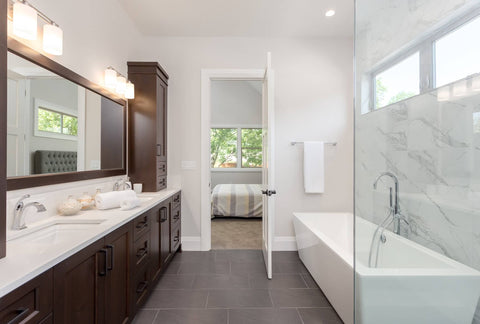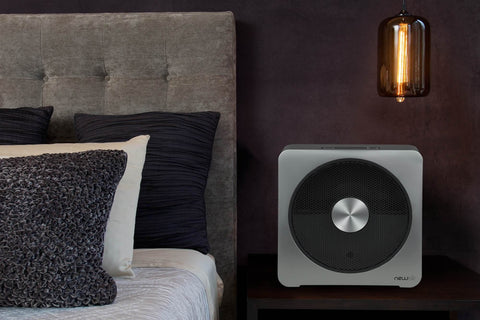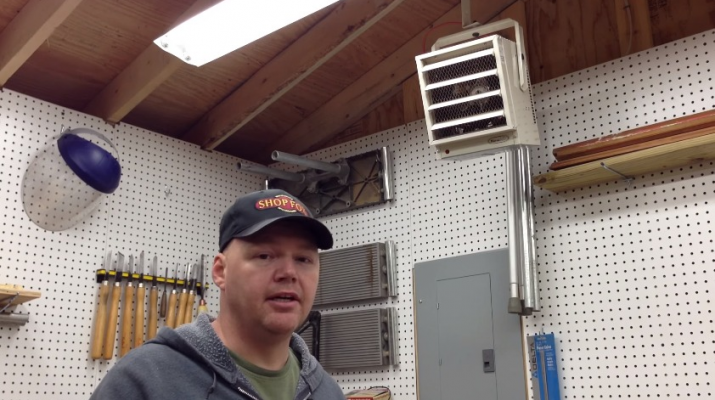How Do Heaters Work? Your Crash Course in Heaters 101
For anyone who has to deal with four separate seasons, heaters make life a whole lot more comfortable!
Thousands of years ago, a fire in the cave may have allowed our ancestors the opportunity to survive the snowy seasons. Centuries later, fireplaces and wood stoves would help warm our homes and cook our meals.
Nowadays, we’re spoiled for choice. Take a closer look at a few examples of your heating system choices:
- Baseboard Heaters: Whether electric or forced hot water heaters, baseboards are an ideal choice for smaller rooms and hallways.
- Space Heaters: These portable home heating solutions typically require electricity, but some have their own power supply (typically propane).
- Infrared Heaters: These are some of the safest heaters to use because infrared radiation is environmentally friendly and energy efficient.
- Central Heating: A furnace isn’t cheap and requires professional installation and servicing, but it’s effective and convenient if you have a whole house to heat.
So how do you choose the right system to keep your home full of comfortable, warm air all winter long? Here’s the information you need to decide which heater is right for you.
How Do Heaters Work?
There is a wide variety of heaters available on the market today. While some of the same principles apply to most heaters, each make and model has subtle variations. While many furnaces are powered by gas, oil or other fossil fuels, smaller heaters often rely on electricity. The primary component common to all electrical heaters is the electrical resistor.
When you turn a heater on, the electrical current that is produced heats up the nichrome wire components — better known as the heating coils — in the unit. Electrical energy is turned into heat as the current passes through the resistor. That’s why electric heaters are also known as resistance heating units.
The next step in the heating process depends on whether or not the heater has a built-in electric fan or not. If there is a fan, it will help draw cold air into the heater. The air passes over the heating elements and then is pushed out into the room — this is similar to how hair dryers work. This is also known as convection heating because the warmth is transferred through the air. Convection heaters are a good way to warm a space quickly by getting hot air to circulate around the room.
If there is no fan in the heater, air enters the unit from below. The air flow passes over the coils, is heated and finally finds its way out through the top of the device. This style of electric heating is known as radiant heating — think of a conventional electric stove with a heating element. It’s a good choice for small spaces and areas where you can be near the heat source while it’s in use. Electric baseboards are radiant heaters and provide an effective way of introducing thermal energy to a room without changing the infrastructure of your home.

What Are the Most Popular Heaters?
Several different types of heaters are popular with consumers who want to save money and energy heating their homes. Here are five favorites:
What Are the Benefits of Portable Heaters Over a Central Heating System?
There are several benefits should you choose to use a portable heater instead of an expensive central heating system.
They’re Cost Effective
There are three main ways that portable heaters will save you money:
- You will consume only as much energy as is needed to heat the spaces in your home that are being used. During the day, if most of the family is at school or work, just turn the space heaters off or down. Use a portable heater to warm the spots where people are working, cooking or watching TV and let the heat follow you around the house.
- Portable heaters do not require any installation. Some units can be wall-mounted, but all can be easily moved and stored when the weather warms up. This saves you money on installation costs.
- Portable heater maintenance is an easy DIY affair. Simply follow the guidelines set out in the user manual and keep the unit clean. There is no need for expensive service calls and regular professional maintenance tasks as there is with a heat pump or steam radiator system.
They’re Environmentally Friendly
Portable heaters allow you to heat only the areas that you need to keep warm, so you use less energy overall. Almost no energy is wasted converting electricity to heat so you get the best use of the energy you pay for. They also help reduce demand for high-polluting petroleum products like oil and natural gas — especially if you choose green electricity providers. Infrared heaters are one of the most popular choices for those who are environmentally conscious.
They’re Versatile
Portable heaters provide a perfect solution to heat places where central heating is not a viable option, as in a shed, garage or unfinished basement. They also work well in homes that are still under construction or renovation.
In some situations, you may need to keep one room in your house warmer than the others. Perhaps an elderly relative is sensitive to the cold, or a family member has come down with the flu. Newborns babies or an aging family pet will also appreciate the extra comfort a portable heater will provide — without bothering family members who like a cool bedroom.
FAQs About Electric and Portable Heaters
Can I Use My Heater Outside?

Absolutely! A portable heater can be used for outdoor BBQ parties, fall picnics and overnight backyard camping adventures for the neighborhood kids.
If you are traveling but uncertain of the accommodation that awaits you at the end of your journey, be sure to pack a portable heater. Do you ice fish? A small, portable heater would be a great gift!
Portable heaters are also great for warming up an office or lunch room where you can’t control the air conditioning. Small spot heaters can be placed by your desk to keep you cozy at your workstation. Super energy-efficient and very quiet, nobody (not even the boss!) can complain.
Is There Anywhere I Should Not Use My Heater?
While all portable heaters have built-in safety features to prevent overheating, there are a few considerations that are worth remembering:
- Even if you have used portable heaters in the past, read the manual when you purchase a new model. Keep it close at hand for troubleshooting should you have any problems operating the device.
- Always keep your heater away from combustible objects and surfaces. This includes making sure the power cord does not pass under a rug or carpet that is made from a flammable material. It is also essential to understand the voltage requirements of your heater and plug it into an appropriate outlet.
- Keep your heater away from moisture and do not place it in any area that may be subjected to leaks or splashes. Never attempt to handle your heater if your hands are wet. If you decide to store the unit during the warmer months, make sure it is in a safe, dry place where small children cannot get to it.
- Do not place your portable heater in a tight spot. Air must always be allowed to flow in through the heater’s intake valve. If it becomes blocked, the heater will be wasting energy as it has to work harder to pull air into the unit. This increases your electricity bills, while decreasing the lifespan and efficiency of your heater.
- Never leave a heater unattended. If you don’t plan on staying in the room or area where it is located, turn the power off. Never place a heater where it could be tipped over by pets or kids, and make sure that it is always on a stable, level surface.

How Can I Save Money Using My Heater?
Try these tips to make sure your heater is running at peak efficiency to save money on your utility bills:
- Make sure that you have a heater that adequately meets your needs but is not too powerful for the space where it has been situated. Using the wattage and BTUs you can accurately calculate the heating capacity you require and purchase an appropriate heater.
- Turn the unit off when it is not needed. Remember some types of portable heaters will need a few minutes to warm up, so check the manufacturer’s guidelines to see if this is necessary.
- Keeping most portable heaters properly maintained is an easy task. There is no need for professional servicing unless you have problems with the unit malfunctioning or overheating. Do not attempt to repair the inside components of the heater by yourself, though, as this may invalidate the warranty. With regular cleaning and a little TLC, your heater will keep you warm through many a winter!






Julia on